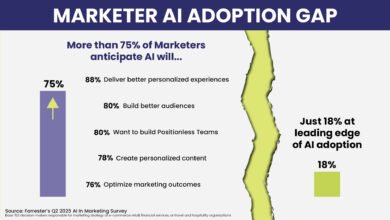From Data Chaos to AI Success: A Practical Framework

▼ Summary
– AI’s effectiveness in marketing is entirely dependent on underlying data quality, as poor data will cause models to fail.
– Poor data quality has significant business consequences, including frustrating workflows, inaccurate lead scoring, and costing organizations 15-25% of revenue annually.
– Marketing leaders, not just IT, must take ownership of data quality as they own the customer journey and the data’s integrity.
– A four-tier maturity model (Chaotic, Inconsistent, Systematic, Optimized) helps assess data readiness, with the goal of reaching the Systematic tier for reliable AI value.
– To unlock AI value, organizations should prioritize three areas: field-level hygiene and taxonomy governance, identity resolution for a unified customer view, and real-time data integration.
The true power of artificial intelligence in marketing hinges entirely on the quality of the data that fuels it. AI is only as strong as the data beneath it, and when that foundation is built on fragmented, inconsistent, or outdated information, even the most sophisticated models are destined to underperform. Moving beyond the initial excitement of AI implementation requires a sober look at the underlying data infrastructure, as this is the single greatest determinant of success or failure. Without a solid base, ambitious projects can quickly become sources of frustration rather than engines of growth.
Consider the tangible consequences of poor data quality in everyday marketing operations. A lead routing system that relies on mismatched customer identifiers will inevitably frustrate sales teams and damage inter-departmental trust. A lead scoring model trained on a jumble of inconsistent job titles, such as CEO, C.E.O., and Chief Executive Officer, will systematically undervalue high-potential prospects. Similarly, a personalization engine working with incomplete customer profiles ends up delivering irrelevant recommendations, actively degrading the customer experience it was designed to enhance. The financial impact is significant; studies indicate that organizations lose between 15% and 25% of annual revenue due to the inefficiencies and missed opportunities created by bad data.
For marketing leaders, treating data quality as solely an IT responsibility is a critical mistake. The credibility of AI across the entire organization is at stake. Since marketing owns the customer journey, it also bears responsibility for the integrity of the data that represents it. This necessitates a cultural shift, moving data readiness from a technical afterthought to a shared, cross-functional priority. Success demands clear executive sponsorship and robust alignment between marketing, sales, and IT to establish common definitions, governance, and metrics. When data is treated as a foundational enterprise asset, AI adoption becomes a collaborative effort rather than a territorial battle.
To understand where your organization stands, a practical assessment framework is essential. This four-tier maturity model helps clarify the current state of data readiness.
In the Chaotic stage (0–25% data confidence), data is fragmented and unreliable. Teams use different naming conventions for the same fields, customer records are duplicated across systems, and campaign attribution regularly fails. Marketers often resort to maintaining personal spreadsheets to fill the gaps, a clear sign that official systems cannot be trusted.
The Inconsistent stage (26–50% data confidence) shows some progress, with a few standardized fields and basic validation rules in place. However, enforcement is weak, and integrations between platforms often lag, causing sync delays. Reports typically require manual adjustments before their figures can be considered accurate.
Reaching the Systematic stage (51–75% data confidence) marks a turning point. Here, defined governance processes are largely followed, automated validation catches most errors at the point of entry, and data flows in near real-time between core systems. Most importantly, a single source of truth for customer identity is established, giving the business confidence that all teams are working from the same information.
The ultimate goal is the Optimized stage (76%+ data confidence), where data quality becomes proactive. Predictive monitoring tools flag potential issues before they impact campaigns, and cross-functional alignment on governance is seamless. With an AI-ready architecture, marketing can execute real-time personalization at scale, and a culture of continuous improvement ensures data quality evolves with business needs. Most organizations begin at Tier 1 or 2; the objective is not perfection but reaching Tier 3, where AI can reliably create value without constant manual intervention.
Tackling data readiness can seem daunting, so it’s crucial to focus efforts on the areas that deliver the greatest return. Three priorities are particularly impactful for unlocking AI’s potential.
First, field-level hygiene and taxonomy governance are non-negotiable. If teams cannot agree on the meaning of a data field, AI certainly cannot. Establishing a single, shared taxonomy for terms like “Campaign ID” builds a common language that ensures clean reporting, reliable processes, and confidence across the board.
Second, identity resolution is critical for creating a unified customer view. AI needs to recognize customers as whole individuals, not as disconnected fragments across a CRM, marketing automation platform, and customer data platform. Stitching these records together provides the single view of the buyer that is essential for delivering relevant, non-repetitive customer journeys.
Finally, the speed of data matters. Integration pipelines must support real-time sync to keep pace with customer behavior. If product usage data takes days to update, any “real-time” personalization effort is already working with stale information. Reliable, instantaneous data flow transforms AI from a reactive tool into a proactive one, enabling campaigns to adapt in the moment.
Ultimately, the impact of marketing AI is built on this unglamorous but mission-critical foundation of data readiness. The organizations that achieve sustainable results are those that prioritize clarity, consistency, and timeliness in their data long before they encounter major roadblocks. By building a trustworthy data foundation, marketing teams gain the confidence to scale AI initiatives that truly deliver value.
(Source: MarTech)




